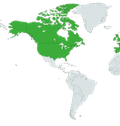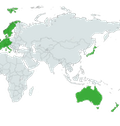It's complicated. Internally, the EU absolutely has a gradient of wealth that is used exploitatively against its workers - both to grow the reserve army of labor, do a kind of internal offshoring of industrial labor, and to funnel hyperexploited migratory workers from particularly eastern EU member states into fields with harsh labor conditions, low pay and in some cases no official employment status or working under legally dubious business models (namely in construction, agriculture, nursing, the meat industry, logistics and sex work). There's debt colonizing in places like Greece, there's austerity dictates that hit poorer member states particularly hard. Bordering states are also used as a buffer zone to contain migrants from outside of the EU under the Dublin protocol, usually under horrifyingly inhumane conditions (which is recently being replaced more and more with internment of migrants outside of EU borders, Libyia being the prime example). Within this framework, there is a mirroring of the dynamic between the global North and the global South. It's also worth keeping in mind that racism in Europe works differently from racism in the US, and can absolutely include racialization and marginalization of people that would be considered part of the white racial in-group in the USA, particularly when it comes to Slavic people.
Externally, the EU as a whole is part of the same power block. On this level of geopolitics, all of its members are tied into the same military alliances, economically benefitting from protectionist measures and a collective bargaining power that extends to all of its members. Some member states will act more like wild cards, but overall, they are all within the green zone of
Nations outside of the EU, but geographically within Western Europe, such as the UK, Switzerland or Norway, are very clearly global North countries, which is why i have stuck with talking about the EU here. Lastly there are non-EU members that are either from the post-Soviet sphere or used to be block-free nations during the Cold War, and their positions can be different from what i've outlined here, but there is a general tendency to keep them as EU membership prospects and slowly integrate them into the system i've described in the first paragraph. Turkey is a special case, being both a NATO member since forever and an EU membership prospect since (and most likely for) forever.
It's complicated. Internally, the EU absolutely has a gradient of wealth that is used exploitatively against its workers - both to grow the reserve army of labor, do a kind of internal offshoring of industrial labor, and to funnel hyperexploited migratory workers from particularly eastern EU member states into fields with harsh labor conditions, low pay and in some cases no official employment status or working under legally dubious business models (namely in construction, agriculture, nursing, the meat industry, logistics and sex work). There's debt colonizing in places like Greece, there's austerity dictates that hit poorer member states particularly hard. Bordering states are also used as a buffer zone to contain migrants from outside of the EU under the Dublin protocol, usually under horrifyingly inhumane conditions (which is recently being replaced more and more with internment of migrants outside of EU borders, Libyia being the prime example). Within this framework, there is a mirroring of the dynamic between the global North and the global South. It's also worth keeping in mind that racism in Europe works differently from racism in the US, and can absolutely include racialization and marginalization of people that would be considered part of the white racial in-group in the USA, particularly when it comes to Slavic people.
Externally, the EU as a whole is part of the same power block. On this level of geopolitics, all of its members are tied into the same military alliances, economically benefitting from protectionist measures and a collective bargaining power that extends to all of its members. Some member states will act more like wild cards, but overall, they are all within the green zone of

Nations outside of the EU, but geographically within Western Europe, such as the UK, Switzerland or Norway, are very clearly global North countries, which is why i have stuck with talking about the EU here. Lastly there are non-EU members that are either from the post-Soviet sphere or used to be block-free nations during the Cold War, and their positions can be different from what i've outlined here, but there is a general tendency to keep them as EU membership prospects and slowly integrate them into the system i've described in the first paragraph. Turkey is a special case, being both a NATO member since forever and an EU membership prospect since (and most likely for) forever.